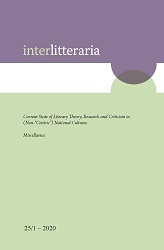Mediated World and Attention Crisis: Unhappy Consciousness a Hundred Years Ago
Mediated World and Attention Crisis: Unhappy Consciousness a Hundred Years Ago
Author(s): Tanel LepsooSubject(s): Social history, Novel, Estonian Literature, Cognitive Psychology, Interwar Period (1920 - 1939)
Published by: Tartu Ülikooli Kirjastus
Keywords: representation; mediation; crisis; unhappy consciousness; ecology of attention; Paris;
Summary/Abstract: The atmosphere of the 1920s in many ways resembles that of today. The accelerated technological development and the loss of previously stable points of reference led to the emergence of literary characters who were suffering from an identity crisis and delved into themselves, characters who could not adjust to a dominant value system that fell short of their standards but whose intellectual acumen did not allow them to resort to mere nostalgia for the past. Philippe Chardin, inspired by Hegel, has named them characters with an “unhappy consciousness”. This article focuses on the work of Estonian writer Reed Morn, specifically one of her novellas. It argues that aesthetic experience and spatial distance from the homeland may allow a character with an unhappy consciousness to find a positive solution that could be described as an ecology of attention. Such an approach can also be productive in today’s hypermedia age.
Journal: Interlitteraria
- Issue Year: XXV/2020
- Issue No: 1
- Page Range: 110-123
- Page Count: 14
- Language: English

